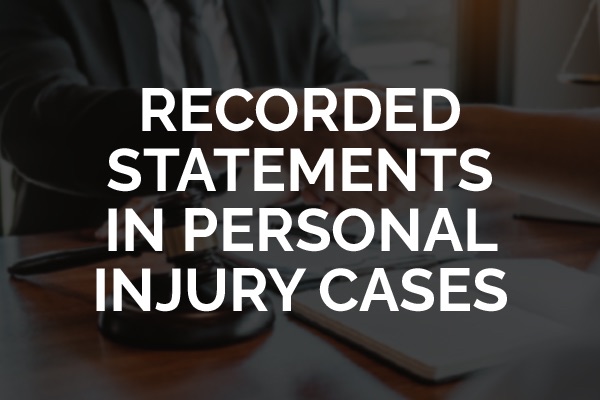
Imagine a regular Monday. Driving to work, focusing on the road, and running down your to-do list for the day mentally. You come to a stoplight and stop successfully, but the car behind you, who has been texting and driving, fails to stop.
They smash into your car, damaging the bumper and violently throwing you forward before your seatbelt catches you and forces you back. A trip to the doctor’s office reveals the accident gave you whiplash and strained muscles in your neck and back.
You plan to seek compensation for the damages to your car and the medical expenses that have accrued due to your injuries. An insurance claims adjuster calls you, asking whether or not you would be willing to give them a recorded statement.
Hesitant, you wonder whether or not a recorded statement can hurt or help your claim. Here is some information you should know about recorded statements concerning your personal injury case:
Why Does An Insurance Adjuster Want a Recorded Statement?
A recorded statement allows the insurance adjuster to get a clear picture of your side of the story. This helps them put together the pieces of what happened from the start of the accident all the way through to the aftermath.
Without a statement from you, they only have information from the person they are insuring. Along with police statements, witness statements, and the official accident report, they will then try to come up with a settlement for the claim.
Many insurance adjusters take a pleasant approach, trying to sound friendly and understanding to sway you to speak with them. However, it is important to remember that they aren’t really concerned about you. You are just another name on a list of claims they have to work through.
The Danger Behind Recorded Statements

Recorded statements aren’t just about setting the story straight for the insurance company. Adjusters are also trying to trip up individuals so they will say things that would hurt their claim.
This can be as simple as answering the question, “How are you?” with an “I’m fine, how are you?” Using that exchange, they would make the argument that an injured person wouldn’t say they are fine.
However, the decision of whether or not to give a statement is yours to make. There are some things you should be careful of, though. Remember that whatever you say will become part of your claim.
If you are feeling confused, don’t understand a question, or need more time to sort out medical details or your own thoughts on the event, don’t feel pressured. You can decline to give a statement or send them a written statement instead.
You also have the right to put off giving a statement until after you have spoken with your personal injury attorney. Most attorneys, such as the team at the Hernandez Law Group, P.C., do not charge for the initial consultation. This makes it a lot easier to understand how to handle an insurance adjuster’s recorded statement or what to do next concerning your claim.
Thankfully, if you decide to go forward with a car accident attorney, you will no longer have to deal directly with the adjuster. Your attorney will help you handle the adjuster, ensuring that there are no misleading questions aimed at making your settlement less than you deserve.
What Are Some Common Questions Asked By Insurance Adjusters When You File a Claim?
A claim adjuster will typically start each recorded statement by saying their name, and the date, and then asking you to state your name and contact information such as address and phone number. These questions often follow:
- Do you understand this statement is being recorded?
- Have you agreed to allow this statement to be recorded?
- Do I have your permission to record this conversation?
- What Is the make, model, and year of the car you were driving?
- Are you the car’s owner?
- Were you driving your car for business purposes?
- Were other vehicles involved?
- Was your car damaged?
- Did you have any passengers?
- How did the accident happen?
- When did the accident take place (date and time)?
- Were there any witnesses?
- Were you using a cell phone when the accident happened?
- Did you take any actions to try and avoid the accident?
- What are your injuries?
- Did anyone call an ambulance?
- Were you treated at the scene?
- Have you seen a doctor or health care professional since the accident?
- Did you use any drugs or alcohol 24 hours before the accident took place?
- Are you employed?
- What kind of work do you do?
- How much money do you make?
- How are you doing today?
- Do you suffer from any chronic conditions or old injuries?
What Would the Hernandez Law Group, P.C. Recommend?

Our team highly recommends against giving a recorded statement to an insurance adjuster. These individuals are masterminds at tricking claimants into saying things that would weaken their claim. Adjusters do this because their goal is to pay out as little money as possible.
If your injuries are serious and you’ve filed a lawsuit, giving a statement to the insurance adjuster will serve no purpose.
Instead, you will give a statement with your attorney present during the deposition phase of your lawsuit. The last thing you need for your case is two different accounts that may conflict with each other.
If you have been in an accident and need help seeking out compensation for injuries or damages, the Hernandez Law Group can help! We offer a free no-obligation consultation to go over your case.
Because of our extensive experience, we also have no problem helping you with insurance adjusters. Don’t allow the insurance companies to bully you into accepting a settlement that is less than you deserve; contact our team today!
More Resources:
